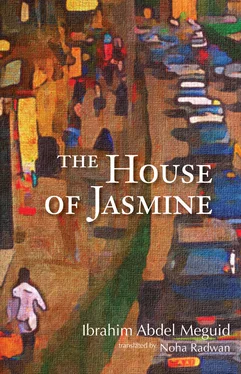#
I confessed everything to Hassanayn, Magid, and ‘Abd al-Salam. I hesitated at first. Maybe I just needed to get a load off my chest. I almost stopped in the middle of the story. I was afraid that they would understand nothing more than the basic facts — that I was a thief. But they only laughed. Maybe they were just trying to avoid hurting my feelings, but they kept laughing. They never criticized any of what I had done. Every night they asked me to repeat the story, and then laughed at it again. I said that although I shared their laughter, I felt afraid every day when I went to work. At the very least, the chairman could force me to pay back what I had taken of the workers’ money. In that case, I would have no choice but to return the apartment to ‘Abdu al-Fakahani and become homeless.
Hassanayn said that people quickly forgot scandals, and Magid said that there might even be some people who secretly approved of what I have done. Then Hassanayn reminded me that it had been two weeks since my meeting with the chairman, and that if he were planning to do anything about it, he would have done it by now.
#
I opened my first bank account with the three hundred pounds. I couldn’t believe my eyes when I read the news in the Al-Ahram newspaper on the bus one morning. I remembered our meeting, and how the chairman had seemed really shaken, even while he was threatening me. He must have known it then. The poor man!
“You’re lucky, Shagara,” said al-Dakruri when he came to my office later that afternoon. I hid my smile.
“The chairman of the board has been in a difficult situation since the January demonstrations. The national security police discovered that the shipyard was a communist den, and that there was no record of a worker named Sayyid Birsho, and by the way, they have not found him yet. This week, they arrested three workers who were affiliated with secret organizations.”
“Did the chairman write a report about me? Does the new chairman know anything about it?”
He smiled and said, “No. I just came from a meeting with him. He invited me and the department managers to meet with him on his first day.”
I’m saved, I thought, then said to al-Dakruri, “I will not take part in any more rallies.”
I added forty pounds to the three hundred after we received a bonus of one month’s salary on the occasion of inaugurating a new ship. A picture of the new ship appeared in the newspapers, with the new chairman standing next to it and smiling. Alexandria was blanketed in winter weather, so I didn’t go out in the evening. I thought of visiting my mother as soon as the weather cleared. She was buried with my father in the cemetery of ‘Amud al-Sawari, in a public graveyard for the people from the town of Dalgamon who had emigrated to Alexandria. I have never seen that town, but I know that it is in the al-Gharbiyya governorate, and that it is between Kafr al-Zayyat and Tanta, and was the home town of ‘Umar Lutfi, founder of the cooperative movement in Egypt. When the weather cleared, I forgot about visiting my mother, maybe because I hate cemeteries.
At the café, Hassanayn said, “I heard rumors that the new chairman of the board was appointed to punish the workers.”
“He said it himself in a general meeting! His first decision was to cancel the temporary exemption from military service, which used to be granted to technicians in the shipyard because it serves as a strategic resource. Now more than three thousand technicians have been drafted in one month. Production has dropped dramatically.”
Magid was busy playing backgammon with ‘Abd al-Salam. After pushing his glasses up on his nose, he said, “It isn’t a matter of demonstrations. The shipyard was a Soviet project in the first place.”
“Thank God that Bata is Italian!” Hassanayn joked, and we all laughed so loudly that we startled the people around us.
“If Bata were Soviet,” Magid said, “they would have beaten all of you with shoes. They would have beaten you especially, Hassanayn. Look. Imagine it!” He started pointing at Hassanayn and pantomiming the scene in the air with his hands, while ‘Abd al-Salam and I couldn’t stop laughing. “You’re standing in the middle of a crowd of soldiers. The soldiers are all barefoot, holding their shoes instead of guns. You’re on your knees, blindfolded, and your hands are tied behind your back. Ready. . Aim. . Fire! The target is the July 23rd Revolution known as Hassanayn! Ready! Load! Beat!” We almost fell off our seats with laughter. Magid has the face of an innocent child. He seems serious most of the time, and if you thought about it, you would think that he was altogether too serious about most things. But, on the other hand, when he jokes he jokes with all his heart.
I got up and stretched my back, which was beginning to ache from all that laughing. The other customers were giggling at our hilarity, and so was the waiter, Muhsin, who almost never laughed, which made us laugh even harder. They say that Muhsin has been depressed since he got married. Three months after the marriage there were strange changes in the voice and body of his wife, who finally turned into a man!
“You were the one who described yourself as the July 23rd Revolution,” ‘Abd al-Salam said to Hassanayn, whose face had turned quite red. I found myself calmly asking Hassanayn, “By the way, why does your company make such ugly shoes?”
“A shortage of molds, Shagara,” he replied. Magid was no longer sitting among us. He was bent over, holding his belly, and exploding with laughter. The strangers sitting around us were staring at the strange scene. I had deliberately asked the question seriously, and Hassanayn answered in the same manner. Both the question and the answer became a complete farce.
I’m indeed happy to have paid my debts, opened a bank account, ended the scandal, and escaped punishment. I had firmly decided to begin looking for a wife. Now it seemed impossible that I had been the cause of my mother’s death or that God was punishing me. I had escaped many evils with ease, which meant that He was on my side. I thought of wandering around the branch administration offices, away from my office where I was besieged by files and dust, in order to sniff out members of the opposite sex. Now, sitting here at the café, I realized that I knew all the female employees in the administration offices, and that they were all either married or engaged. It had been five years since any new employees were hired, and it isn’t reasonable to expect that a girl would stay unmarried for five years after she starts working. Furthermore, most of the female employees have been working for longer than that. After Magid sat back down, ‘Abd al-Salam said, “We must be going crazy. All this laughing is unnatural.”
“Why should we go so far?” asked Magid, struggling to keep from laughing further and wiping the tears from his eyes, having taken off his glasses. “Dr. Musa, who works with me at the pharmacy, is constantly swearing at the country and the people, and wondering why people never get well, and why the nation doesn’t just kill them and get it over with. He also says that he will not rest until he has a chance to work abroad, specifically in Kuwait.” Then he laughed again, and we struggled to restrain ourselves from joining in.
“You must be working with Dr. Hitler without knowing it,” said Hassanayn, and this time we didn’t laugh. ‘Abd al- Salam said, “By the way, I have decided to go work in Iraq.” We all fell strangely silent, as though we hadn’t been laughing our hearts out only a few minutes earlier.
A baby was born with a tail — a perfectly ordinary event that could happen. A week later, Alexandria found out that it had happened again, and people started talking about it. Just one week later, it was rumored that a woman had had a third child with a tail, and it soon became known that Shatbi hospital was filled with newborn babies with tails. Every pregnant woman hoped for a miscarriage, and some of them died trying to abort themselves. It was said that the year was cursed, so people stopped getting married. Strong-willed men stopped making love to their wives, while the weaker ones sent their wives to their parents or divorced them until the end of the year.
Читать дальше












